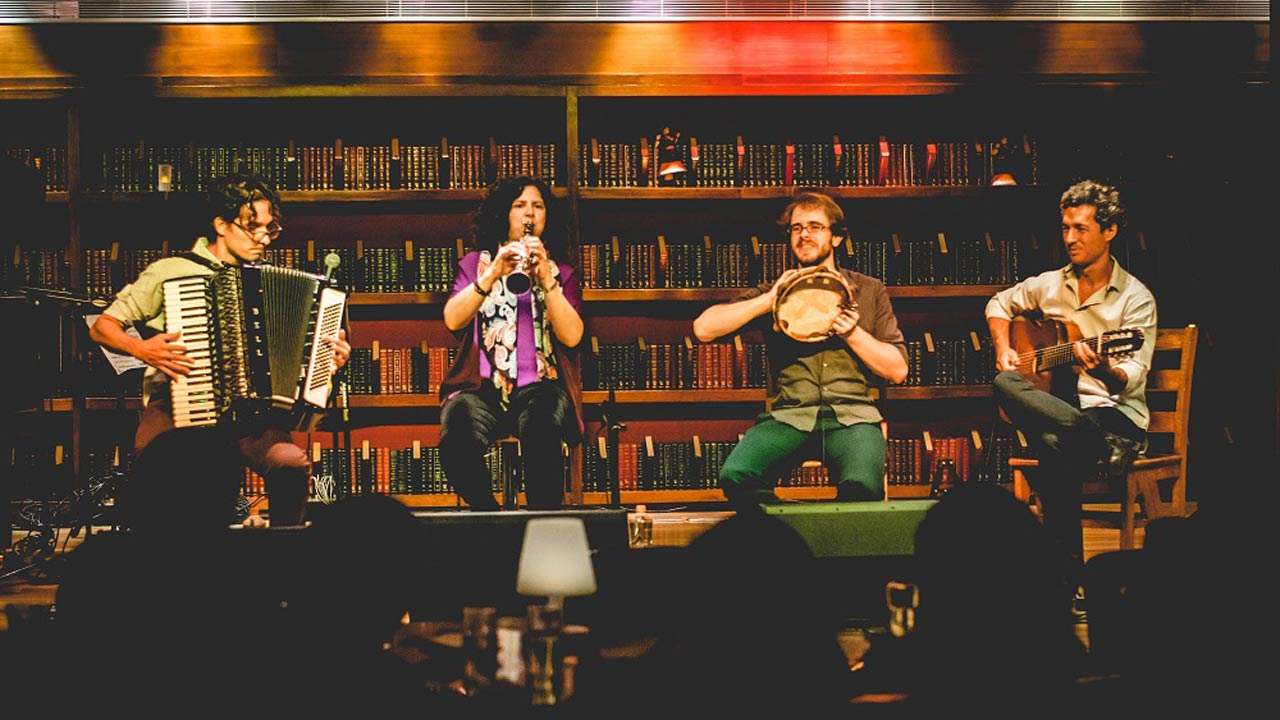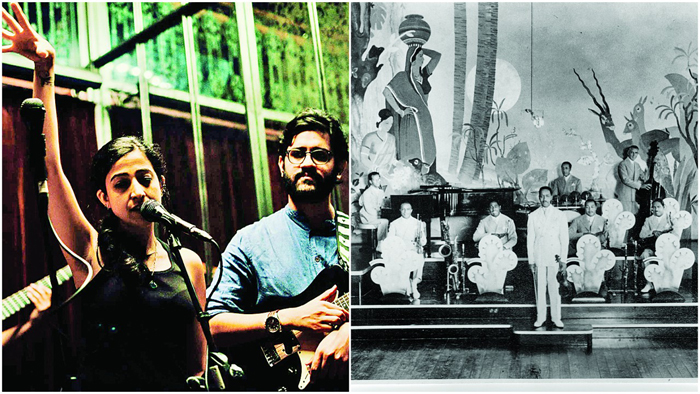
In the 1930s, Leon Abbey and his Afro-jazz band came to 'Bombay' and changed the music scene forever. Patrons, with a taste for western culture thronged the Taj Mahal Palace Hotel, which opened its doors to musicians from across the world. 'Bombay' with the Taj, Rang Bhavan and several mushrooming jazz dance clubs, and 'Calcutta' with its myriad restaurants like Trinca's, Moulin Rouge, Mocambo and Blue Fox, became centres for the music to grow and thrive for decades to come. Even Bollywood imbibed the spirit of jazz in it's own numbers, Shammi Kapoor's jiving with swing music became a signature move in all his films and Geeta Dutt crooning Mera Naam Chin Chin Choo, which went on to become a chartbuster.
In the '60s and '70s, with the advent of rock 'n' roll, the pendulum swung away from jazz. And with the end of free Jazz Yatras (talent from the US travelling to Mumbai each year for extravagant concerts) in the late 1980s, the genre slid into obscurity. Jazz venues shut down, or focused on other forms of music.
"India became a part of the global music circuit in the 1860, partly because of the British rule and partly because of the westernised Indian class. Minstrel music and light opera came to India as it made its way around the rest of the world. But Jazz simply followed other kinds of popular music that already existed in India," explains Naresh Fernandes, author of Taj Mahal Foxtrot, a prolific book on the history of jazz in Mumbai. "Jazz was on a downswing from the '60s, when rock music came in. This is because it stopped being entertainment and became art. And when it became art, it stopped being popular."
Cut to 2018, however, and as one awaits International Jazz Day (April 30), one finds a renewed interest in the genre that has germinated over the past decade. Though it remains in the periphery, jazz has carved out a niche for itself. The reason can be traced to a global increase in interest, and to a few individuals who sowed the seeds locally. From the early 2000s, a number of young jazz musicians like Jason Moran, Christian McBride, Joshua Redman and Vijay Iyer, emerged. 2011 saw the launch of the Postmodern Jukebox by an American pianist and arranger, Scott Bradlee. This musical collective, which concentrates on creating jazz and swing covers of popular songs, acted as one of the major factors in an international revival of interest. "Jazz is 120 years of musical evolution. There are lot of things in motion [in the genre], the stronger affiliation of pop and jazz (brought into popular culture by Postmodern Jukebox) will help bring jazz back into some amount of focus," says Arjun Sagar Gupta, Founder of The Piano Man Jazz Club in Delhi.
Jazz enthusiast, writer for Rolling Stone magazine and LP collector, Sunil Sampat says that the music that is coming back now is not the dancey swing from the '30s and '40s but a far more intricate style, falling into the school of maestros like Louis Armstrong, Thelonious Monk, Miles Davis and Duke Ellington. "Jazz has always had a following of listeners. The sound that was popular in Mumbai during the '40s to '60s was only a small fraction of jazz – three minute numbers to dance to. The music that is coming back now is a much more experimental and versatile sound," he explains. "A few years ago, you had perhaps only the Blue Frog in Mumbai that was doing something about jazz. Now, in Mumbai alone, you have The Quarter, which focuses solely on jazz, you have jazz nights taking place at Finch, Bonobo and The Cuckoo Club. The NCPA also curates a jazz festival each year and also has artistes coming in year round for concerts."

(Left to right) Time Wise performs at The Piano Man Jazz Club; Leon Abbey’s band which brought jazz to India in 1935 (courtesy: Jehangir Dalal Collection)
A major reason for a resurgence in the interest around jazz comes from the launching of venues and festivals that focus on the genre. Over the last decade, more and more venues have opened up for live gigs. Some of them kept their focus on jazz. "When I opened the Blue Frog, we were one of the only spaces for live music. Since it was a space created by musicians, we focused a lot on the quality of acts," recalls Ashutosh Pathak, who owns one-fourth of The Quarter, a venue located at The Royal Opera House of Mumbai that focuses on jazz performances. "A lot of other venues opened up subsequently – and many closed down too."
With jazz nights becoming a regular event at The Quarter since late 2017, the scene in Mumbai has got a new shot in the arm. "To us, jazz is not just trad jazz — it's any kind of improvisational, free-flowing music. It is ever-evolving and more people are coming into it every day," Pathak explains. However, there remains a long way to go. Pathak adds that The Piano Man Jazz Club in Delhi, Shisha Jazz Cafe in Pune and Windmills Craftswork in Bangalore remain the measly handful of spaces for jazz music.
Another initiative was launched in 2012 by the Jazz Addicts – Pradip Bhatia and Apurva Agarwal. "Pradip and I sat down one day to discuss how we could do something to give back to society. Pradip being a jazz buff himself, we came up with the idea to give the genre a boost by curating concerts across the country," recalls Agarwal. "We focus on the traditional, acoustic jazz played by artistes around the world." In 2018 alone, the Jazz Addicts have organised three concerts in March, four in April and several more through August and October.
Time Wise, a group of Ahmedabad-based mavericks, was formed as the result of a jazz festival organised by one of its members in 2015. Guitarist and founding-member Raag Sethi recalls his surprise in finding so many jazz enthusiasts in a city that lacks a vigorous night life. "I knew Marc Damania (the bassist) but met the other members at the festival. Our saxophonist Harmish Joshi, especially came as a surprise, since I had no idea that someone even plays the saxophone in the city," he laughs. Owing to a strong Youtube presence, the band has now collected its own set of followers and performed at both The Piano Man Jazz Club and The Quarter.
A more established musician in the field is Vasundhara Vee. With over a decade of experience as a jazz vocalist, she agrees that there has been an increase in interest towards jazz. "Jazz was considered dead when I started out. That was the era of rock music in clubs," she recalls. "However, venues soon caught on that featuring jazz can draw in a crowd. Expats turned up, as did travellers and spenders. With an increase in the programming and visibility at these clubs, we are in a better space now."
"If you are looking at the jazz scene today, you cannot ignore the contribution of the teachers," proclaims musician and founder of Bflat Bar, Bengaluru, Aarti Rao Shetty. "True School of Music in Mumbai, Swarnabhumi in Chennai and Global Music Institute in Delhi are just a few of the schools that are doing a great deal to introduce kids to the genre at a young age."
Pathak, who is also the co-founder of the True School of Music, admits that a lot of the talent that comes to perform at The Quarter are ex-students from his school. "Jazz is the ultimate expression of what they learn in school — a freewheeling articulation of their classical roots."
Another school that has tried to demystify jazz not just among its students, but also for the public is 12 Keys in Kolkata. Founder Pradyumna Singh Manot, aka Paddy, is himself a member of 4 on a Swing, a jazz band that has performed at the famed Panama Jazz Festival. "We want to give our students a wholesome experience, so that they not only know music theory but can also use their art to earn a living," he says.
12 Keys has jazz as an integral part of its curriculum and also hosts workshops on jazz appreciation and curates trivia events at pubs and bars, explains Ahona Sen, one of the educators at the institute.
"The jazz scene in Kolkata is in flux right now, but it is seeing a definite rise in the rest of the country," reiterates Manot. "Jazz was once the popular music of the times, just as Mozart was once pop when it was the music of dance halls. Unfortunately, given the choice between quality music and mediocre music one can dance to, people choose mediocrity. All we can do is keep playing, keep hosting workshops, so that people can understand jazz, and maybe take a liking to it."
Louiz Banks: The keyboardist and singer is referred to as the Godfather of Indian jazz.
Braz Gonsalves: Hailing from Goa, this saxophonist is one of the pioneers of Indo-jazz fusion in India.
Sanjay Divecha: The guitarist is known for his innovative style.
Pradyumna Singh Manot: A noted keyboardist, he also has his school of music.
Sonia Saigal: This vocalist keeps up her father Don Saigal's legacy.
Launched in September 2015 by Arjun Sagar Gupta, this jazz club has a speakeasy vibe that lends itself to jazz. Though the club doesn't host only jazz musicians, the genre remains the focus. "We've had over 200 international bands and artistes play with us... [and] are approaching 1000 nights of live music from opening night," says Gupta.
The city's only pure jazz venue plays host to jazz artistes every Thursday. They also organise an annual jazz festival every August.
One of the first venues to focus on live music in the city, Bflat Bar founded by Aarti Rao Shetty, a jazz musician herself, reflects her background. "I grew up surrounded by jazz in Mumbai, so when I moved to Bangalore, it seemed only natural to bring that legacy with me," says Shetty.
Located at Mumbai's iconic Royal Opera House, The Quarter is an intimate venue which has breathed new life into the city's jazz scene. "We happen to be the only space in Mumbai that focuses on jazz. Despite sporadic efforts, there still remains a dearth of spaces for performers across India," says Ashutosh Pathak, co-owner.
This cosy microbrewery hosts two to three jazz nights a month, including some international giants. "We just had Anne Hampton perform, and people came all the way from Delhi and Chennai," says marketing manager Adrian Mackay, adding that the pub is packed on jazz nights with faithful regulars, expats, jazz enthusiasts and music lovers.